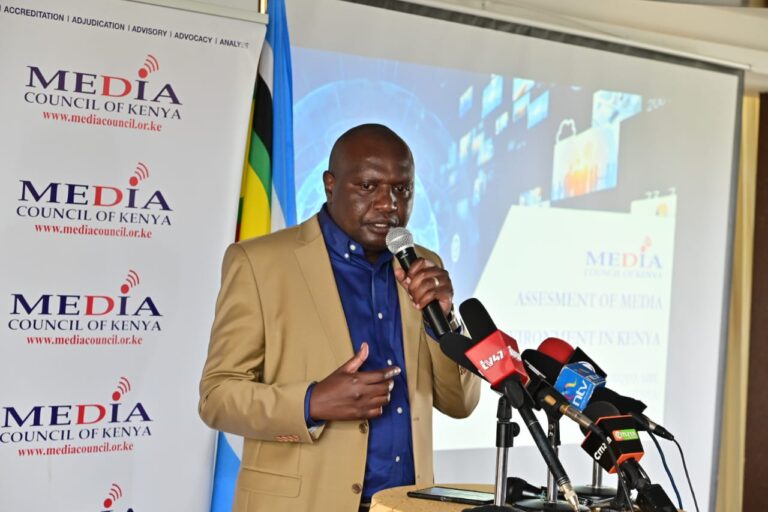Kenyan journalists are working in precarious conditions across the country as a result of systemic issues that significantly impact their well-being, safety, and ethical conduct.
According to a report by the Media Council of Kenya, findings paint a stark picture of vulnerability and instability within the country’s media landscape.
Key Findings on Journalist Welfare
- Medical Coverage: 52% of journalists lack medical cover, while 48% have access to it. MCK emphasised the vulnerability this creates, stating, “One illness can reduce a journalist to destitution without comprehensive medical cover.”
- Contracts: 75% of journalists in media houses have written contracts, but 80% of freelance journalists operate without any formal agreements. Among those with contracts, 45% hold one-year terms, 41% have contracts exceeding two years, and 7% each have three- or six-month contracts. Notably, 71% of contracted journalists are temporary, with only 29% in permanent roles. MCK noted, “Temporary employment undermines job security, morale, and the quality of journalism.”
- Leave Allowance: 53% of journalists receive paid leave allowance, while 47% do not, further straining their financial stability.
Safety Concerns
The report identifies significant safety risks, including lack of protective gear, denial of access, threats, and physical attacks. Other issues include equipment destruction, psychological harassment, restrictive laws, and absent risk assessment protocols.
MCK stated, “Arrests, legal prosecution, phone tapping, abductions, and unjustified dismissals are rampant, threatening journalists’ ability to work freely.”
Ethical Challenges Financial constraints severely impact journalistic integrity, with 62% of journalists reporting that economic limitations hinder their adherence to the code of conduct.
Specifically, 26% cited moderate impact, 18% minimal impact, and 17% significant impact.
MCK warned, “Financial insecurity forces journalists into ethical compromises, undermining the universal principle: seek the truth and report it.”
Recommendations: MCK proposed actionable solutions:
- Longer-Term Contracts: Media organisations should prioritise contracts exceeding two years to enhance job security. “Stable employment retains skilled journalists and elevates journalistic standards,” the report stated.
- Permanent Positions: Employers should increase permanent roles to boost morale and retention.
- Freelancer Welfare: The Kenya Union of Journalists (KUJ) and stakeholders should develop standardised freelance contracts, ensuring minimum benefits like medical cover and paid leave.
- Safety Protocols: Media outlets, professional bodies, and the government must implement robust safety measures, including protective gear, risk assessment training, and digital cybersecurity.
Data Collection
The survey targeted journalists accredited for 2024/2025, covering national, local, and foreign long-term media practitioners across 47 counties.
Speaking at a World Press Freedom Day event on May 2, 2025, MCK CEO David Omwoyo underscored the urgency of addressing internal challenges within the media ecosystem.
He criticised the lack of cohesion among media associations, likening their dysfunction to “ants in a shaken jar, descending on each other.” Omwoyo called for reflection, stating, “Sometimes the greatest threats to press freedom are internal. We must put our house in order.”
On journalist welfare, he emphasised dignity, drawing inspiration from global calls for workplace respect: “The dignity of workers is non-negotiable. Half of our journalists lack medical cover, and 80% of freelancers have no contracts—this is a crisis.”
Addressing safety, he highlighted inconsistencies in police actions, noting, “The police speak of protecting press freedom, but their actions often contradict their words.”
Omwoyo also tackled the ethical implications of technology in journalism, urging caution: “Technology can amplify truth or distort it. The ethical question remains: Does it cause harm? Journalism’s universal role is to seek the truth and report it, no matter the tools used.”
Call to Action
MCK’s report serves as a clarion call for media stakeholders to prioritise journalist welfare, safety, and ethical standards. As Omwoyo concluded, “We cannot demand accountability from others while ignoring the crises within our ecosystem.”
The council plans to release its full State of the Media report on May 15-16, 2025, alongside the Journalist of the Year awards.




